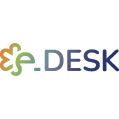ABOUT eDESK
What is eDESK about?
eDESK is about hybrid university education, fostering the digital and entrepreneurial skills of teachers and students..
Over the last year we have seen how the COVID-19 pandemic has turned our lives upside down. We live surrounded by technology, but this situation has made visible some gaps that university education needs to fill to offer young Europeans a development in line with today’s demands.
To address these needs, e-DESK puts the focus on continuous teacher training. We want to enhance the digital skills and entrepreneurial competences of teachers by designing a hybrid methodology in which face-to-face teaching and digital environments are combined. Through this proposal, the final idea of eDESK is to bring education closer to all students, to understand their way of using technology so that education adapts to new uses and to blur the frontiers through the possibilities offered by digital environments.
OUR GOALS
DESIGNING A HYBRID METHODOLOGY
to develop education, both in physical classrooms, outdoors and in digital environments.
BRINGING EDUCATION CLOSER
through a hybrid methodological solution (physical and digital) to reach students anywhere in Europe and the world.
PROFESSIONAL DEVELOPMENT
of university teachers to make them able to respond to the needs of their students.
DEVELOPING DIGITAL SKILLS
of university teachers and to know methods for their effective incorporation into lessons.
ENTREPRENEURIAL COMPETENCIES
of university educators to better understand European youth’s needs to improve their employability and social integration.
KNOWING THE USE
that young people make of technology, in order to adjust the design of our teaching activities.
eDESK has included at least 40 HEI Educators (professors, teachers, lecturers, researchers, assistants, etc) from Universidad de Cantabria (UC), Universidade Nova de Lisboa (UNL), University of Zagreb (UNIZG) and Lappeenranta-Lahti University of Technology (LUT) who have tested the deliverables proposed, contributing to an iterative process for validation and quality increase of the final outcomes.
In addition, at least 100 professors, teachers and educators in participative countries have had the opportunity to express their needs in an initial survey. By providing a digital training that has been promoted especially among European HEI educators, but accessible to any interested person, we contribute to increasing the online educational skills of 1000 participants. This intervention benefits 80 university students who have taken part in the pilot experiences carried out by educators from the four universities partners of this project.
In addition, whenever possible, we have promoted the inclusion of young people with a migrant background. In addition, whenever possible, we have promoted the inclusion of young people from immigrant backgrounds. In addition, 160 key stakeholders, especially from the education sector and policy makers, have participated in 4 multiplier events in 4 countries.

